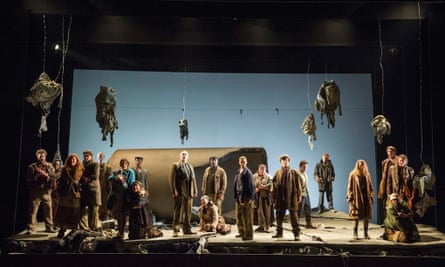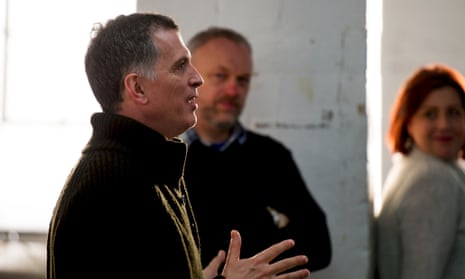Hi James, what can you tell me about English Touring Opera?
English Touring Opera (ETO) produces between five and 10 operas at various scales each year. Though based in London, the company has no home and no fixed company, which allows for enormous flexibility and adaptability. Last year our total audience numbers passed 50,000 in the UK, with nearly 40,000 in theatres and the rest in schools and concert venues.
Although smaller in scale to the fixed London and regional companies, we still have up to 80 artists and technicians on the road for months at a time. These artists will be performing for theatre audiences in the evenings and for eager young school audiences in the daytime – always with new work. In addition, the company produces new work for children with profound learning difficulties and has a lively collaborative practice in creating song cycles with people with dementia.
We make the very best work we can for as many people as we can – and we place artists first in the creative process. We know our existing audiences pretty well; they are our principal ambassadors in attracting new people to opera.
Your upcoming production of La Bohème will be the first time ETO has toured it in 10 years – why return to it now?
Two reasons: like everybody else, I love it; and I think we are ready to make a great job of it, with some remarkable artists.
How and why do you decide a specific work gets a certain treatment?
There is nothing proper about art, ever. Anything that sets out to meet expectations only is dull. There is no “traditional” way of doing opera. A handful of operas are set in a very specific period – and I would want to hear a very good reason for shifting them about – but what otherwise does the “right period” mean? The date of composition? The date of the play on which it is based, or the story on which the play was based?

Sadly, what some people mean by traditional is a sort of general “days of yore” – cloaks and big frocks. Somehow the meaninglessness of such a gesture is comforting.
So much opera is about history. It is, or at least can be, compelling and sophisticated. Two of our upcoming productions – The Siege of Calais and The Wild Man of the West Indies – have very interesting things to say about history: about the sometimes contradictory claims of family and society; about choice and destiny. I’m sure that in both we will do everything we can to tell the story clearly, with respect to those thrilling ideas and sensations, in an effort to help people see what wonderful operas they are.
What are the main challenges you face as ETO’s general director?
The main challenge is making good work and ensuring it is seen by many, ordinary people. We don’t always have enough money to do that as well as we could, simply because live art with many live artists costs more than the price of admission.
So it’s true: we have the difficult task of raising more money for non-elite experiences in theatres we don’t own. But it’s also an amazing privilege to be supported by Arts Council England, along with some generous trusts and donors, to do what we do. So let’s say the challenge and the privilege balance each other there.
It’s also a big challenge to take your audience with you when you do new work, or operas that are not numbered in the top ten titles. There is only one way to overcome this, and I am pretty sure it is working for us now: you just get a reputation for doing things well, with serious care, and you trust your audience to be creative and interesting people of good will. They are, of course, and they deserve no less.
What are your views on the rise of digital screenings of opera?
The amount of entertainment offered by computer screens and televisions is strong competition to all live performance forms. We all have to get much smarter about articulating what’s different about being with other people at a live performance, and resisting the temptation to make live performance more like what people seem to enjoy on screens. What’s different is the selling point.
I am very keen that ETO makes a thoughtful and interesting response to popular digital platforms. It won’t be streaming live shows, I don’t think; that’s about as interesting as your dad wearing jeans that show his bottom. I’d love to partner up with some people who are making interesting, inexpensive, risky digital interventions, and seeing if lyric theatre can lend itself to their work. We’re working on it.
Any tips for the wannabe opera artistic directors out there?
My title is general director (both artistic director and CEO), which is a good title and a good practice. There is no division between art/production and finance. It’s crazy when there is.
So work your way up, if you can. It’s the only way to be good. Work in marketing or development – learn how to keep books. Artistic directors who don’t know what money buys and how it is raised always leave chaos in their wake. Maybe work in education/outreach; you can make interesting art in that context, and the audience has no anxiety about the new.
Another tip if you want to work in opera: learn how to read music. Take singing lessons, so you learn something about the physical technique and the discipline that creates performance.
It’s also not about how brilliant you are; it’s about putting people together and creating the right conditions. Don’t be afraid to hire people who might be better than you are (how many music directors will dare to do this?).
Also, resist jargon, don’t read reviews until a year after the opening and listen more than you talk (I’m still learning this one). Finally, stop doing it if you lose faith. Question your faith every time you start a new project. Spend time in foyers, talking to the public, even if you hate what you hear; if you don’t learn what they see and hear, you will be trapped in your own intentions.
James Conway is general director of English Touring Opera
Join our community of arts, culture and creative professionals by signing up free to the Guardian Culture Pros Network.

Comments (…)
Sign in or create your Guardian account to join the discussion